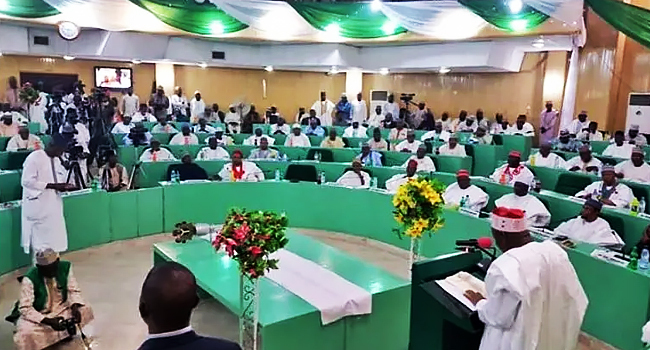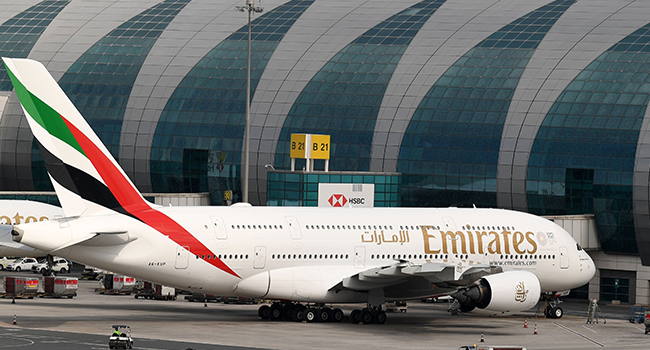The Kano State House of Assembly has officially passed a bill dissolving all five emirate councils in the state. This decision followed deliberations on the floor of the house during a plenary session held on Thursday.
The significant move came as the Kano State Emirate Council Amendment Bill was considered and passed after successfully scaling its second and third readings.
The Deputy Speaker, Alhaji Muhammad Bello Butu Butu, articulated the rationale behind the dissolution.
He emphasized that repealing the law that divided the Kano Emirate into five separate entities would help “revive the lost glory of Kano.” He further stated, “The division of Kano Emirate into five reduced the capacity and dignity of the state at the national level.”
READ ALSO: Truck, Bus Collide On Lagos-Ibadan Expressway, Causes Gridlock
Echoing these sentiments, the Majority Leader, Alhaji Lawan Hussaini Dala, underscored the cultural implications of the previous division. “The emirate council served as a custodian of our culture, which was distorted by the creation of additional emirates,” Dala said. He elaborated that the amendment aims to restore the traditional prestige and unity of the Kano Emirate.
In a briefing with journalists, Dala explained that with the amendment of the law, all five emirate councils were now abolished. “The commissioner for local governments will serve as the overseer,” he added, highlighting the transitional governance structure that will be put in place.
Additionally, the House adopted a motion to create a new second-class emirate council in the state, signalling a restructuring of the traditional institutions to better align with the state’s cultural and administrative goals.
This legislative action marks a significant shift in the governance and cultural landscape of Kano State, aiming to restore the historical and cultural integrity of the region’s traditional institutions.
Sanusi’s Travails
Sanusi was a governor of the Central Bank of Nigeria (CBN) before he was appointed as the 14th Emir of Kano by the administration of former governor Rabiu Kwankwaso, with Ganduje as deputy governor of the state before the latter eventually became governor in May 2015.
Prior to his appointment on June 14, 2014, he was suspended as the apex bank governor by former President Goodluck Jonathan in February 2014. This comes two months after Sanusi, in a leaked letter to President Goodluck Jonathan, revealed that the Nigeria National Petroleum Corporation (NNPC) failed to remit US$48.9 billion of government oil revenue to the apex bank. After a series of public investigations and raising the alarm on the US$20 billion NNPC scandal, Sanusi was booted out and replaced with Sarah Alade who oversaw the affairs of the CBN before the appointment of Godwin Emefiele in substantive position.
In April 2014, he won a court case against the Federal Government, after he was detained and his international passport confiscated by the Department of State Services (DSS).
Sanusi/Ganduje Rift
As Kano emir, Sanusi fell out with the Ganduje administration and had a feud with the governor over his outspoken nature.
The then state government said he was removed “to safeguard the sanctity, culture, tradition, religion and prestige of the Kano emirate,” accusing the emir of “total disrespect” of institutions and the governor’s office.
But Sanusi’s supporters believed he was ousted for opposing Ganduje’s re-election in 2019.
Upon securing a second term mandate, Ganduje split the Kano emirate into five and appointed four more emirs – to weaken Mr Sanusi’s influence.
Boost Chances
Five years after his controversial removal as emir, the Kano State House of Assembly resolved to amend the law after Majority Leader Hussien Dala moved the motion during plenary.
“The need to revisit the Emirs Law has become imperative to address the issues that have arisen from the 2019 amendment. We must ensure that our traditional institutions are governed by laws that reflect fairness and justice,” Dala said.
On his part, the Speaker of the Kano House of Assembly, Jibril Isma’il Falgore, promised to ensure that the process of amendment follows due process and transparency.
The Kano State House of Assembly on Tuesday, May 21 resolved to amend the 2019 law through which Sanusi was deposed.
The law that booted Sanusi from office is known as the Kano State Emirs (Appointment and Deposition) Law. It was promulgated in 2019 by the Ganduje administration after having a running battle with the deposed emir.
Now, the parliament is controlled by the opposition New Nigeria Peoples Party (NNPP).
Earlier, former governor Rabiu Kwankwaso pledged that the issue of Sanusi’s sack would be revisited. Kwankwaso controls Kano, the north-western state known for its huge voting population.
If signed into law, the move is expected to see the return of the 14th emir of Kano, Sanusi II who was deposed in 2020.




